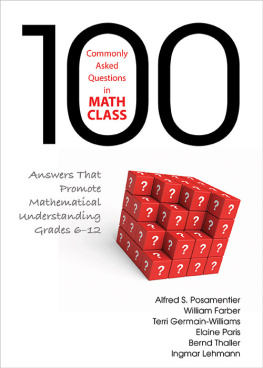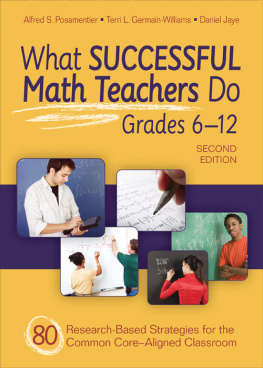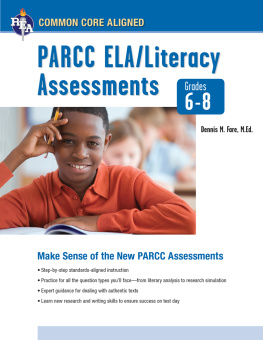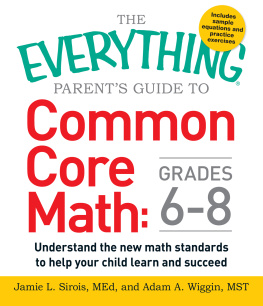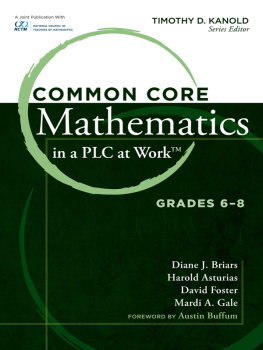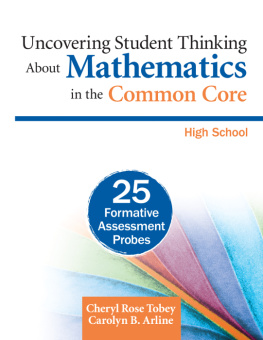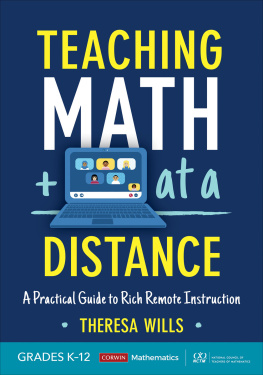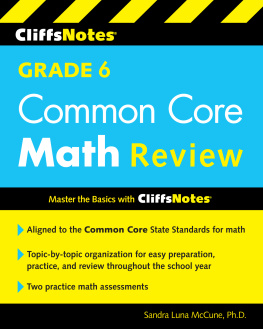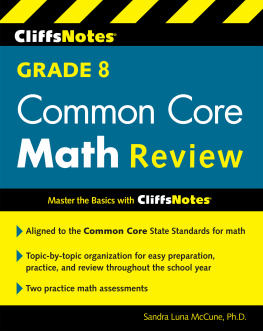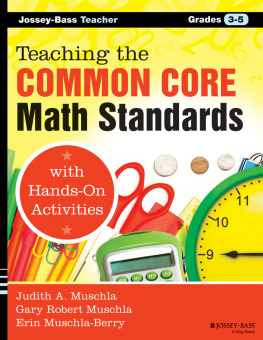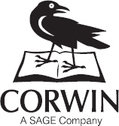FOR INFORMATION:
Corwin
A SAGE Company
2455 Teller Road
Thousand Oaks, California 91320
(800) 233-9936
www.corwin.com
SAGE Publications Ltd.
1 Oliver's Yard
55 City Road
London EC1Y 1SP
United Kingdom
SAGE Publications India Pvt. Ltd.
B 1/I 1 Mohan Cooperative Industrial Area
Mathura Road, New Delhi 110 044
India
SAGE Publications Asia-Pacific Pte. Ltd.
3 Church Street
#10-04 Samsung Hub
Singapore 049483
Copyright 2014 by Corwin
All rights reserved. When forms and sample documents are included, their use is authorized only by educators, local school sites, and/or noncommercial or nonprofit entities that have purchased the book. Except for that usage, no part of this book may be reproduced or utilized in any form or by any means, electronic or mechanical, including photocopying, recording, or by any information storage and retrieval system, without permission in writing from the publisher.
All trade names and trademarks recited, referenced, or reflected herein are the property of their respective owners who retain all rights thereto.
Printed in the United States of America
Library of Congress Cataloging-in-Publication Data
Tobey, Cheryl Rose, author.
Uncovering student thinking about mathematics in the common core, grades 6-8: 25 formative assessment probes/ Cheryl Rose Tobey, Carolyn B. Arline.
pages cm
Includes bibliographical references and index.
ISBN 978-1-4522-3088-7 (pbk.)
1. MathematicsStudy and teaching (Middle school)
2. Mathematical abilityEvaluation. 3. Individualized instruction. 4. Effective teaching. I. Arline, Carolyn, author. II. Title.
QA135.6.T588 2014
510.71273dc232013024391
This book is printed on acid-free paper.
13 14 15 16 17 10 9 8 7 6 5 4 3 2 1
Acquisitions Editor: Jessica Allan
Associate Editor: Kimberly Greenberg
Editorial Assistant: Heidi Arndt
Production Editor: Melanie Birdsall
Copy Editor: Alison Hope
Typesetter: C&M Digitals (P) Ltd.
Proofreader: Theresa Kay
Indexer: Molly Hall
Cover Designer: Anupama Krishnan
Preface: Mathematics Assessment Probes
Overview
Formative assessment informs instruction and supports learning through varying methods and strategies aimed at determining students' prior knowledge of a learning target and using that information to drive instruction that supports each student in moving toward understanding of the learning target. Questioning, observation, and student self-assessment are examples of instructional strategies educators can incorporate to gain insight into student understanding. These instructional strategies become formative assessments if the results are used to plan and implement learning activities designed specifically to address the specific needs of the students.
This book focuses on using short sets of diagnostic questions, called Mathematics Assessment Probes (Probes). The Probes are designed to elicit prior understandings and commonly held misunderstandings and misconceptions. This elicitation allows the educator to make sound instructional choices, targeted at a specific mathematics concept and responsive to the specific needs of a particular group of students.
Diagnostic assessment is as important to teaching as a physical exam is to prescribing an appropriate medical regimen. At the outset of any unit of study, certain students are likely to have already mastered some of the skills that the teacher is about to introduce, and others may already understand key concepts. Some students are likely to be deficient in prerequisite skills or harbor misconceptions. Armed with this diagnostic information, a teacher gains greater insight into what to teach. (McTighe & O'Connor, 2005)
The Mathematics Assessment Probes provided here are tools that enable school teachers in Grades 6 through 8 to gather important insights in a practical way, and that provide immediate information for planning purposes.
Audience
The first collection of Mathematics Assessment Probes and the accompanying Teacher Notes were written for the busy classroom teacher eager for thoughtful, research-based diagnostic assessments focused on learning difficulties and aimed at enhancing the effectiveness of mathematics instruction. Since the publication of the first three Uncovering Student Thinking in Mathematics Resources (Rose & Arline, 2009; Rose, Minton, & Arline, 2007; Rose Tobey & Minton, 2011), we have continually received requests for additional Probes. Both teachers and education leaders have communicated the need for a collection of research-based Probes that focus on narrower grade spans. As well as additional Probes for each grade span, educators were eager for an alignment of the Probes to the Common Core Mathematics Standards (Council of Chief State School Officers [CCSSO], 2010). In response to these requests, we set to work writing, piloting, and field-testing a more extensive set of Probes for middle school teachers with a focus on targeting mathematics concepts within the new standards. This book is one in a series of Uncovering resources for the K2, 35, 68, and 912 grade spans.
Organization
This book is organized to provide readers with the purpose, structure, and development of the Mathematics Assessment Probes as well as to support the use of applicable research and instructional strategies in mathematics classrooms.
highlights instructional considerations and images from practice to illuminate how easily and in how many varied ways the Probes can be used in mathematics classrooms. This chapter also highlights how use of the Probes can support students' proficiency with the Common Core's Mathematical Practices.
Acknowledgments
We would like to thank the many mathematics educators who during attendance at various professional development sessions gave valuable feedback about features of the Probes, including structures, concepts to target, and purposes of use.
We especially would like to acknowledge the contributions of the following educators who provided ideas and field-tested Probes, gave feedback on Teacher Notes, scheduled classroom visits, and/or opened their classrooms to us to try Probes or interview students: John Aresta, Lisa Beede, Joelle Drake, Michael Dyer, Judy Forrest, Tracey Harnett, Renee Henry, Tracy Kinney, Tom Light, Guy Meader, Judy Morgan, Sandra Roderick, Pamela Rodriquez, Joan Savage, Steven Shaw, Kristin Spangler, Jessica West, Ed Worcester, and the math teachers from Maine's RSU 2.


